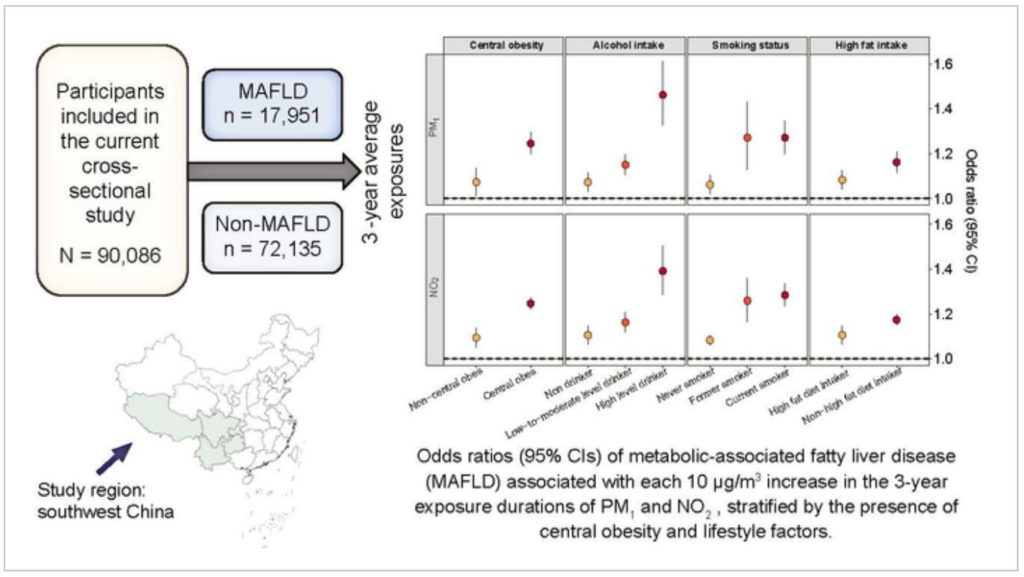MAFLD or Metabolic-associated fatty liver disease is a serius global health problem and carry a significant economic burden.
A comprehensive epidemiologic study conducted in China discovered associations between long-term exposure to ambient air pollution and MAFLD.
According to the study, published in the official journal of the European Association for the Study of the Liver, these links are aggravated by unhealthy lifestyles and the existence of central obesity.
Since the 1980s, the incidence of MAFLD has continuously climbed, now impacting a quarter of the global population and the majority of individuals with adult-onset diabetes, and posing a significant global burden.
MAFLD grew by 40% throughout Asia between 2012 and 2017. It used to be known as nonalcoholic fatty liver disease (NAFLD), and it can lead to end-stage liver illnesses like cirrhosis and liver cancer, as well as liver transplantation and mortality.
Breathing air pollutants has been linked to an increased risk of MAFLD in animal studies. Fine particulate matter exposure, for example, may cause a phenotype similar to nonalcoholic steatohepatitis (NASH), decrease hepatic glucose metabolism, and increase hepatic fibrogenesis.
“The MAFLD epidemic corresponds to environmental and lifestyle changes that have occurred alongside rapid industrialization worldwide, especially in many Asian countries,” said lead investigator Dr. Xing Zhao.

“A growing number of studies have suggested that ambient air pollution, which is the biggest environmental problem caused by industrialization, may increase the risk of metabolic disorders such as insulin resistance and dyslipidemia, and related diseases such as type 2 diabetes mellitus and metabolic syndrome. However, epidemiologic evidence for the association was limited, so we conducted this research to improve our understanding of the effects of air pollution on human health and also to help reduce the burden of MAFLD.”
Based on the baseline survey of the China Multi-Ethnic Cohort (CMEC), a prospective cohort that enrolled nearly 100,000 participants in southwest China from 2018 to 2019, researchers conducted an epidemiologic study on the potential role of ambient air pollution in the risk of MAFLD in approximately 90,000 adults in China. Through verbal interviews conducted by trained staff, the CMEC gathered participant information such as sociodemographics, lifestyle habits, and health-related histories, and then examined anthropometrics, biosamples (blood, urine, and saliva), and imaging data.
Researchers discovered that long-term exposure to ambient air pollution may raise the risk of MAFLD, particularly in men, smokers, and alcoholics, as well as those who eat a high-fat diet. Unhealthy lifestyle habits, as well as an excess of belly fat, may worsen the negative effects.
“Our findings add to the growing evidence of ambient pollution’s damaging effects on metabolic function and related organs,” adds Dr. Zhao and his co-investigators.
“However, physical activity did not seem to modify the associations between air pollution and MAFLD. We suggest that future studies explore whether the timing, intensity, and form of physical activity can mitigate the harmful effects of air pollution.”
Air pollution, according to the researchers, should be recognized as a modifiable risk factor for MAFLD. High-risk populations should be aware of the air quality in their neighborhoods and arrange their activities to reduce their exposure to pollution.
Source: 10.1016/j.jhep.2021.10.016
Image Credit: Getty
You were reading: Long-term exposure to particulate matter may increase risk of fatty liver disease
